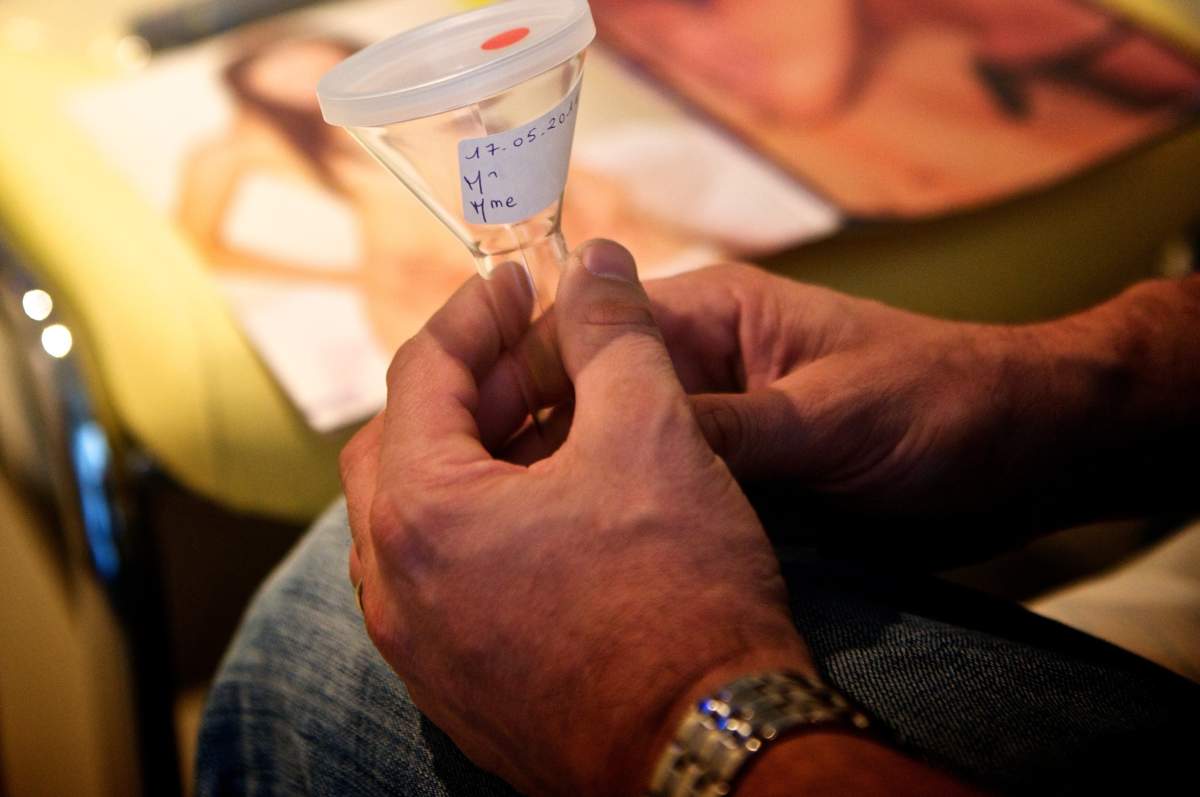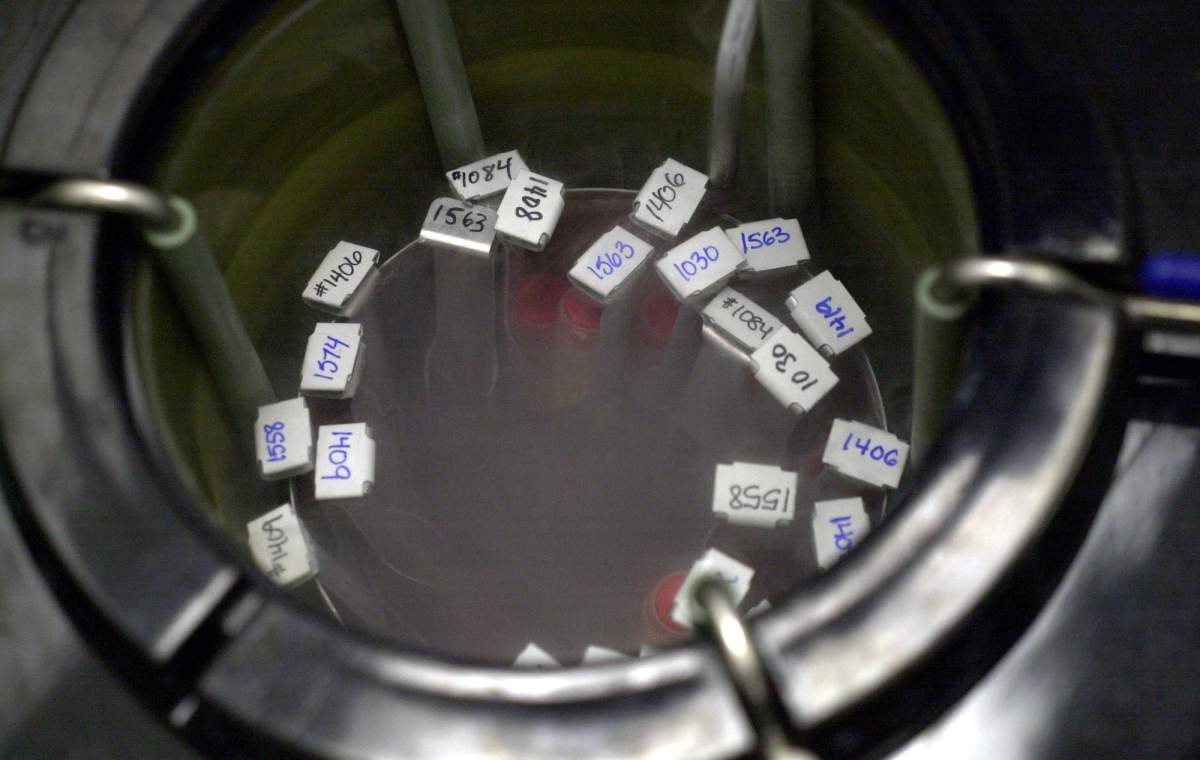John (not his real name) has been a sperm donor for five years.

The 37-year-old said his wife suggested the idea after her friend used a donor to conceive and found a surprisingly small number of Canadians to choose from.
“I donate to help people become parents and it seems like there’s a shortage of donors,” he said.
John is part of a very small group of Canadian men.
READ MORE: Searching for bio-siblings: Families of same sperm donor babies connect online
The sperm bank is so limited that over the years, Canadian women searching for a suitable sperm donor to conceive have increasingly looked to the U.S.
Why? It is illegal for sperm banks in Canada to pay for samples, compared to clinics south of the border, where donors can get about $100 per donation.
Looking local
Repromed is the only clinic in Canada that recruits local men, explained sperm bank director Dr. Tamer Said.
READ MORE: Young, single women turning to sperm donors to conceive
“It’s not easy. The risk-reward ratio isn’t very enticing,” he told Global News.
“We’ve always believed in promoting the Canadian element in family building. We’ve always seen that choosing a Canadian donor would be much more appealing. “
However, many Canadian clinics now only import samples because it’s easier.
READ MORE: Single parent by choice: Women turn to sperm donors to conceive
“We tried recruiting in the past, but it didn’t work because you can’t pay the donors for the sample,” said Haimant Bissessar, president of CAN-AM Cryoservices, adding that it can cost thousands of dollars to recruit and collect samples.
“You can reimburse them for expenses, but Health Canada is working on deciding which expenses are eligible.”
No payment
So, why would men in Canada donate sperm if they’re not being compensated?
John explains his reasons to donate are altruistic and money is not a factor.
READ MORE: 7 fertility myths and misconceptions Canadian women need to know

Get weekly health news
He said he chose to be an open ID donor so any future children will be able to contact him once they turn 18.
“I’m sure there are children out there and I hope they’re enjoying life with their families,” he said.
“If I were to imagine myself as a donor-conceived person, I think I would want to know the identity of my donor.”
Said explains for some, the decision to donate is simple: “you want to give life.”
“We have proven that the Canadian altruistic donor exists; such an individual is out there and they are eager and interested to donate in the same way that you would be interested to donate blood,” he said.
READ MORE: Single Momtreal: An online resource for single mothers across Montreal
Bissessar explains some men have other motivations.
“It could be narcissistic tendencies, a goal to impregnate as many women as you can,” he explained, adding that demand has also become more specific.
“Twenty years ago, women who used donor sperm were in hetero relationships and wanted a donor who looked like their husband,” said Bissessar.
“Now, they don’t want that. The biggest user of donor sperm is single women. They are more picky, they want someone tall, educated. The criteria from the marketplace has narrowed.”
How does the donation process work?
The rules for sperm donation were created in 2000, based on those of blood banks, which were written in the 1970s.
Age (21 to 40 years old), health, as well as sexual orientation play into the criteria.
“For example, a homosexual male can’t be a donor,” Bissessar said.
Said said to be a sperm donor, men have to be eligible to donate blood and he hopes the government will update the donation criteria.
READ MORE: Looking for an egg or sperm donor? Here’s what you need to know
“We don’t really know where they stand on that but we are hopeful there will be more consideration given to scientific evidence rather than just misconceptions.”
About one in 200 potential donors are actually eligible and the donation process is not at all like what you see in the movies, Bissessar warned.
Men are expected to fill out a 20- to 40-page document outlining their medical and life history.
“Each question will be asked two to three different ways, so we can tell if a man is lying,” he told Global News.
There is an infectious diseases test and a psychological test with an interview.
READ MORE: Assisted reproduction rules to be revamped by Health Canada
After, the perspective donor sperm will be tested, frozen and checked to see how well it survives.
All in all, the process takes about three to six months.
Committed to the cause
Said explained, depending on the clinic, donors can be required to stay in the program for about six months.
“The commitment is a commitment to a healthy lifestyle, commitment to provide all medical information,” Said said.
“They have to notify us of any change if they are acquiring a new partner.”
Men are expected to donate a maximum of two to three times a week, with two to three days of abstinence in between.
READ MORE: Everything men and women should know about fertility testing
“If he’s in the program and his sample is not usable because the quality is low, the sperm bank can’t use that sample. So, men drop out because of that,” Bissessar told Global News.
“Each supplier has a target that they set. If they want 100 samples from a man, it could take six months to produce.”
Bissessar explained there is currently a push in Canada to make it legal to pay sperm donors, but he said he doesn’t think that will encourage more people to start donating.



Comments